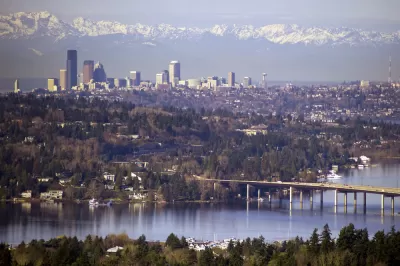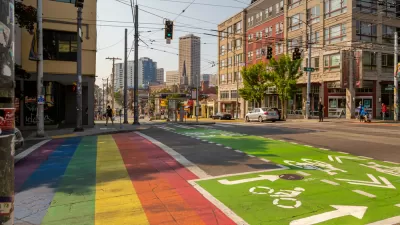Drawing on a slew of examples, Dan Bertolet argues that Washington's State Environmental Policy Act (SEPA) has been co-opted in ways that run against its original purpose: protecting the environment.

When the state of Washington enacted SEPA in 1971, writes Dan Bertolet, "heightened awareness of ecology spawned stricter controls on development. In the subsequent decades, though, we've learned that concentrating new homes in existing urbanized areas is an ecological imperative."
Bertolet's main gripe is with how SEPA appeals are used to stymie construction in urban areas. "Outside of urban housing construction, SEPA is an essential set of environmental regulations. [...] It's in the city where SEPA has gone off the rails."
Under current law, Bertolet writes, "Anyone averse to a proposed apartment building for whatever reason can file a legal appeal through SEPA that delays construction. The risk of appeal introduces toxic uncertainty to homebuilding, because delay, as I've spelled out elsewhere, can rack up costs that bleed projects into the red. The result is fewer new homes." The article includes a wide range of such examples.
"SEPA fixates on what's immediate and localized while ignoring what's long-term and far-reaching. For example, SEPA demands to know how many cars will come and go from a new apartment building, but it is oblivious to how increased housing density reduces car use across a metro region." Bertolet's ultimate conclusion is that SEPA's focus needs to be redefined on the state level.
FULL STORY: Washington’s State Environmental Policy Act Has Become A Bane To Sustainable Urban Development

Planetizen Federal Action Tracker
A weekly monitor of how Trump’s orders and actions are impacting planners and planning in America.

Chicago’s Ghost Rails
Just beneath the surface of the modern city lie the remnants of its expansive early 20th-century streetcar system.

San Antonio and Austin are Fusing Into one Massive Megaregion
The region spanning the two central Texas cities is growing fast, posing challenges for local infrastructure and water supplies.

Since Zion's Shuttles Went Electric “The Smog is Gone”
Visitors to Zion National Park can enjoy the canyon via the nation’s first fully electric park shuttle system.

Trump Distributing DOT Safety Funds at 1/10 Rate of Biden
Funds for Safe Streets and other transportation safety and equity programs are being held up by administrative reviews and conflicts with the Trump administration’s priorities.

German Cities Subsidize Taxis for Women Amid Wave of Violence
Free or low-cost taxi rides can help women navigate cities more safely, but critics say the programs don't address the root causes of violence against women.
Urban Design for Planners 1: Software Tools
This six-course series explores essential urban design concepts using open source software and equips planners with the tools they need to participate fully in the urban design process.
Planning for Universal Design
Learn the tools for implementing Universal Design in planning regulations.
planning NEXT
Appalachian Highlands Housing Partners
Mpact (founded as Rail~Volution)
City of Camden Redevelopment Agency
City of Astoria
City of Portland
City of Laramie





























